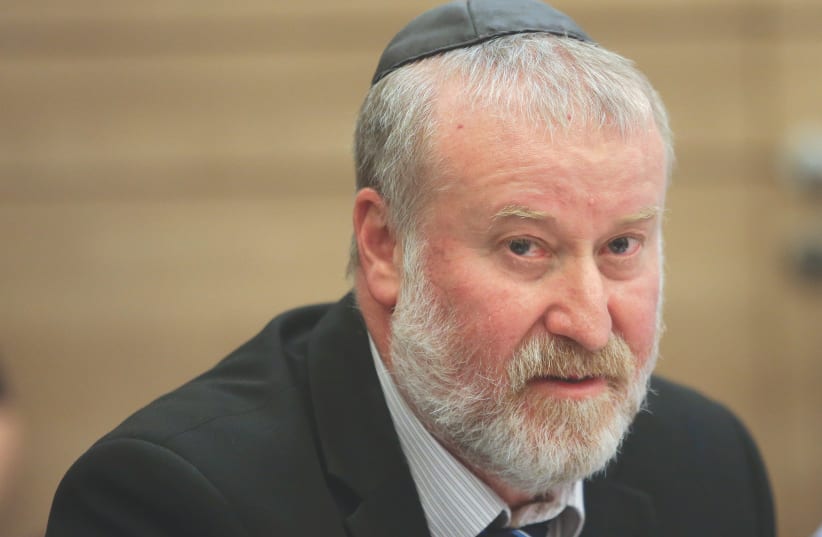This week, Jews around the world marked Yom Kippur, the Day of Atonement. Traditionally, this is the day on which God makes a final judgment as to whether we will survive the coming year, and what kind of year it will be.
In the “Unetaneh Tokef” prayer, we say that God alone will decide “who will rest and who will wander, who will live in harmony and who will be agitated, who will enjoy tranquility and who will suffer, who will be impoverished and who will be enriched, who will be degraded and who will be exalted.”
Also this week, Prime Minister Benjamin Netanyahu’s fate was considered by a more earthly tribunal. Attorney-General Avichai Mandelblit held a hearing in which Netanyahu’s lawyers attempted to convince him to drop all or some of the charges against Netanyahu.
President Reuven Rivlin entrusted Netanyahu with forming the next government, and most of the speculation on how that will go has been about the negotiations and which side will convince the other to compromise. But Netanyahu’s legal situation has the potential to play a huge role in the outcome.
Will Netanyahu be exalted or degraded, enjoy tranquility or suffer, live in harmony or be agitated this year? God only knows, but Mandelblit and the State Attorney’s Office will weigh in with their part of the decision pretty soon.
EARLIER THIS year, Mandelblit recommended that Netanyahu be indicted on three charges of breach of trust and one of bribery. The accusations are in three different cases.
In brief, Case 1000 revolves around nearly NIS 500,000 in gifts, including cigars, champagne and jewelry, that Netanyahu and his wife, Sara, received from billionaire Arnon Milchan – which the State Attorney’s Office alleges were illegal and the prime minister’s lawyers argue were gifts between longtime friends and therefore do not violate any laws.
Case 2000 was about Yediot Aharonot publisher Arnon Mozes asking Netanyahu to support legislation that would limit top competitor Israel Hayom’s ability to distribute its newspapers for free. In exchange, Mozes offered a major shift to positive coverage of the prime minister. Netanyahu did not agree; therefore, Mandelblit considered this a breach of trust and not bribery. Netanyahu has argued that many politicians negotiate with media barons in this way.
In Case 4000, Netanyahu stands accused of bribery for pushing a Bezeq-Yes merger that led to Bezeq major shareholder Shaul Elovitch earning millions of shekels, while Elovitch asked the Bezeq-owned website Walla News to make changes to favor Netanyahu and his wife on October 24, when he has to return the mandate to form a government to Rivlin, who has indicated that he will not grant Netanyahu a two-week extension. Then, Rivlin has two likely choices: either to task Blue and White leader Benny Gantz with trying to form a government, or to punt the decision to the Knesset, which would have 21 days to find a candidate that the majority of lawmakers support. If they fail, an election would automatically be called. Rivlin faced criticism after hinting he would do the second, and it remains to be seen what he will decide.
Meanwhile, Blue and White has kept up its insistence that it will not sit in a government with Netanyahu as long as he is under a recommended or actual indictment. The Likud, of course, reserves the right to choose its own leader, and on Thursday night the Likud Central Committee was expected to reaffirm its commitment to him.
Netanyahu tried to hold a Likud leadership primary to show Blue and White that his party stands behind him and won’t be swayed by their inflexibility, but was deterred in part because of the timeline. Central committee chairman MK Haim Katz told him that at least one month would have to pass before the vote could be held, and that was cutting it too close to a possible Mandelblit decision. Netanyahu didn’t want to be the indicted candidate running against a not-indicted candidate – MK Gideon Sa’ar – so he dropped the idea.
If Netanyahu is not indicted, then his problems are solved and he could have a unity government and a rotation with Gantz. However, countless legal experts have said this is unlikely, based on the merits of the case or on the amount of work invested and reputations at stake in the State Attorney’s Office.
If Netanyahu is indicted – whether for bribery, breach of trust or both – that could be the final thing pushing him out of the Prime Minister’s Office. Not only will that likely cause Blue and White to further dig in its heels, but it’ll weaken his hold on the right-wing bloc and could bring about further insurrection in the Likud, even if the central committee votes to keep supporting him.
On Yom Kippur, when we asked who will be punished by water and who by fire, who by sword and who by beast, Netanyahu may have been wondering who by coalition negotiations and who by indictment.
NOW THAT Mandelblit and his staff – minus the prosecution’s lead lawyer, Liat Ben-Ari, who bafflingly went on a family vacation instead of taking part in the hearing – have heard the Netanyahu legal team’s arguments, there are two clocks running at once.
We don’t know how much sand is in Mandelblit’s hourglass. Some say it could take the attorney-general as little as a month to make a decision – meaning until November 8. What’s almost certain is that we will know whether Netanyahu is indicted, and if so on what counts, by December 15, which is when State Attorney Shai Nitzan leaves his post.
The other clock is for coalition talks. Time runs out for Netanyahu
